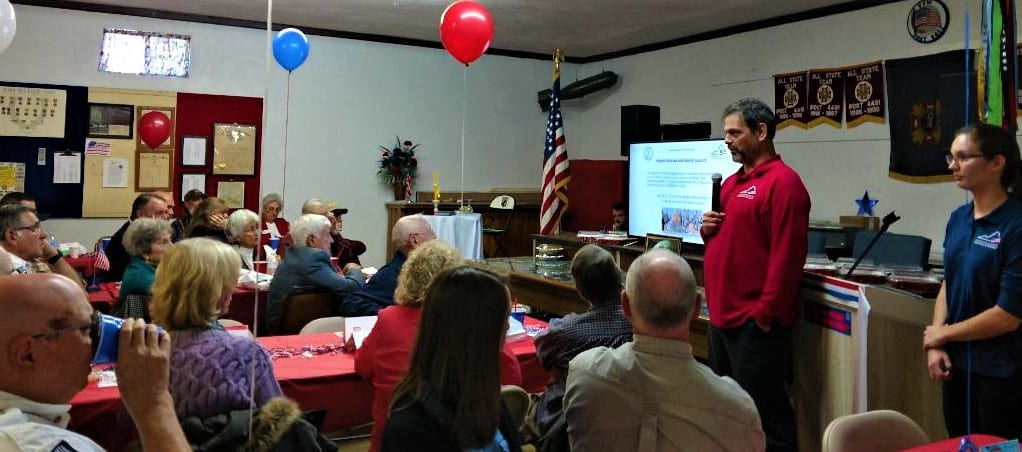Pam Dudding
Contributing writer
Only a Veteran can relate to the torture of war scars. Some are able to heal physically and emotionally and go forward in life while others continue to be in a “war zone” amongst themselves.

Danielle Rock and Asboth Sandor speaking to the Veterans and their families about the new Veteran Assistance Program.
At the recent Military HONOR Dinner on Veterans Day, two representatives – Danielle Rock and Sandor Ashboth – from The Department of Veteran Services spoke on the programs now being offered for Veterans.
Danielle Rock, a Craig County native and graduate of Craig County High School, joined the Army Reserve August 2011. She then signed to be a Military Police Soldier, and attended Fort Leonard Wood for basic training and military police school in 2012.
She was deployed to Afghanistan for nine months in operations and later in intelligence as security personnel, until her company was shipped home in July 2013.
For her remaining active contract of five years, Rock trained and obtained her Sergeant status. She also received her Bachelor of Science in 2018 from Radford University and currently works for the Department of Veteran Services as a Veteran Peer Specialist.
“My passion has been to help Veterans from day one,” she said.
Sandor Asboth lives in Alleghany and joined the 1st Battalion 116 Infantry of the Virginia National Guard while in high school. He received his AAS from Dabney Lancaster Community College and transferred to West Virginia University where he also transferred to 1st Battalion 150 Armor of the West Virginia Guard.
In 2001, he was deployed to Bosnia-Herzegovina and, a year later, in 2002 to Cuba as part of the JTF-Guantanamo security force. Asboth also was deployed in 2007 as a part of Operation Iraqi Freedom. His final deployment came in 2013 to Iraq. He retired in April 2014.
His civilian life included different machine operation positions. In 2015, he joined the Virginia Veterans and Family Support team.
Sandor has been married for 22 years and has three children. “I love the great outdoors. I am an infantryman at heart,” he said.
Both Rock and Asboth shared the many facets of the new program, emphasizing their goal was to open the doors to anyone who had questions or wished to set appointments. “We are here to help you,” they both shared.
The Virginia Veteran and Family Support program, previously known as the Virginia Wounded Warrior Program, now includes Veterans who were not directly wounded as well as programs to help family members.
“The Department of Veterans Services is a statewide, free program that focuses on proudly serving Virginia’s Veterans, family members and caregivers. We connect Virginia’s Veterans and their families to federal and state benefits, support, quality care, and recognition they have earned,” said Regional Director Leanna Craig.
The services include information and assistance with benefits, care services, cemeteries, education, training and employment, as well as family support.
The programs focus is on helping individuals identify, address and successfully resolve presenting needs and challenges, with a special emphasis on challenges resulting from stress-related conditions or traumatic brain injuries connected to military service.
Said Rock and Sandor, “There is assistance for those who have ‘lost their way’ in the civilian life and need an extra hand in adjusting back to civilian life from being in the service.”
Both assist Virginia’s Veterans and their family members with access to behavioral health, rehabilitative and supportive services, placing special emphasis on assisting service members, veterans and families on their road to recovery from the effects of stress-related injuries (such as combat stress, post-traumatic stress or military sexual trauma) or traumatic brain injuries.
This includes:
- Veterans of any era who are Virginia residents
- Members of the Virginia National Guard not in active federal service
- Virginia residents in the Armed Forces Reserves not in active federal service
- Family members of veterans and members of Guard and Reserve
Programs are also available for Veterans who may be or have been incarcerated.
“We also want the families to know that we are here for them as well,” Rock said. “Many Veterans suffer from PTSD and other brain injuries which indirectly impact the family life as well, and we understand that and now have programs set up to help.”
The Veteran Crisis Line number is 800-273-8255 and website is www.dvs.virginia.gov. Rock’s direct number is (804) 839-0480.
Here are some other contact numbers: Toll-Free: 1-877-285-1299, Regional Director – Leanna Craig – 540-556-9112 and Senior Resource Specialist – Kristi Holt – 540-357-1113.
After the program ended, many people stopped at their booth to ask questions and to find out how to pursue their needs. Rock and Sandor stayed until the last question was answered.


